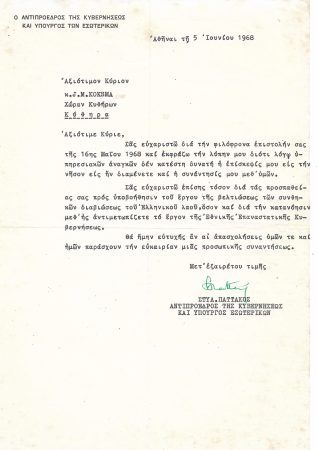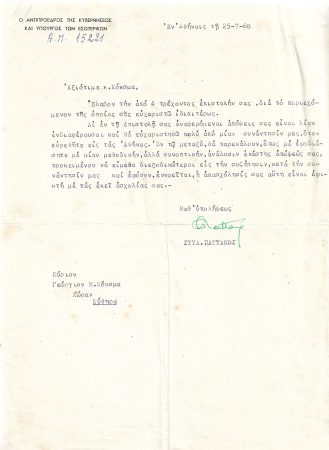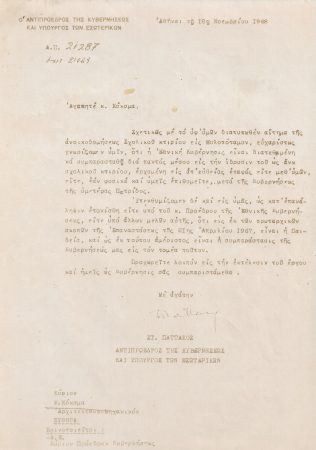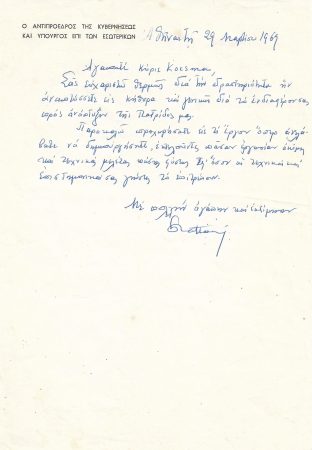Team Kythera in 1967-1971 and their contacts with the Military Junta 1967-1974
At the time the coupe was committed George and Anna had just gone to Switzerland for a retrait and afterwards went on to Holland for a vacation and would not return before the end of May. As it was near Easter the remaining Team members on Kythira were about to make an Easter trip to the mainland. Ida Blok wrote about their bewildering experience these first weeks in her Dutch story “Kolonels?”
The monthly work reports also do not tell much about how George thought about the Junta.
In the report of January 1968 George writes about the calamities that had overcome them. Th 5th was the worst but was not further clarified in the text. Most probably it was about not having any longer technical trainees from HTS Arnhem after 6 consecutive years. An indirect sign of disliking the Junta from those who largely paid the trip and stay of those students.
Only in the monthly report from May 1968 George wrote following:
All people of Kythera were upset because of a short visit of the vice prime minister, Mr. Pattakos was announced.
Slogans were chalked and even painted, meetings were held concerning committees of reception, about petitions, about decorations of towns and houses, about everything that rural communities use to do in such cases. The many communists from Kythera brushed twice their Sunday-dress and whitewashed their houses (twice as well I think). But all of a sudden, things were cancelled, and the cruel dictator had to postpone his visit. (We write “cruel dictator” because we do not want to be earmarked as Fascists by our Scandinavian friends.)
But this visit from Mr. Pattakos to Kythira was cancelled.
In George Koksma’s archive (what was left of it) I found 4 short letters by Stylianos Pattakos. These have been translated in English by Mrs. Maria Diakaki (Friends of Museums of Kythera) and also put in Dimotiki as not all (foreign) Greeks have studied Katharevousa.
Unfortunately, George did not file his own letters he sent to the Junta. But maybe from the received answers one could conclude what George had written to them.
Who was Stylianos Pattakos who answered George letters to the Government?
Stylianos Pattakos (Grieks: Στυλιανός Παττακός) was a Greek soldier and politician. He was born in Agia Paraskevi, Rethimnon on Crete November 8, 1912. At an age of only one month short of 104 he died in Athens October 8, 2016! Pattakos was a brigadier general and the tank commander of Athens and played a key role in the military coup of April 21 in 1967. He became Deputy Prime Minister and Minister of the Interior in November 1967. In the first period he acted as spokesman, but his influence diminished during 1968. He stayed however Minister of the Interior until 1971.
About the Junta
After the constitution was overruled, the colonel’s regime promised reforms in favour of peasants and workers and a new constitution with a vague promise of a future democracy restauration. The regime was characterized by the abolition of civil rights, the dissolution of political parties, and the exile, imprisonment and torture of both politicians and civilians with political beliefs contrary to the regime.
Kythira at that time still was more or less a self-dependent agricultural community and as in the Teams development program animal husbandry and agricultural reform were spear points, one may assume that George had stressed those points and had asked for a meeting at the time of the proposed visit of the Deputy Prime Minister.
Below is the first letter (English translation, original Katharevousa and in Dimotiki) from Deputy Prime Minister Stylianos Pattakos in answer to the first letter that George sent to the New Revolutionary Government:
Athens 5th of June 1968
Dear sir,
Thank you for your kind letter, dated May 16th, 1968. I express my regret, because due to department’s engagements visiting the island you live in and meeting you was not possible.
Thank you also for your efforts in assisting the project of Greek people’s living conditions improvement on one hand, and for the understanding with which you face the work of the National Revolutionary Government on the other.
I would be happy if both your activities and mine, give us the opportunity of a personal meeting.
With sincere appreciation
Styl. Pattakos

ΔΗΜΟΤΙΚΗ ΓΛΩΣΣΑ
In Dimotiki this letter from the 5th of June 1968 reads as follows:
Αξιότιμε κύριε,
Σας ευχαριστώ για την ευγενική επιστολή σας,
της 16ης Μαϊου 1968 και εκφράζω τη λύπη μου, γιατί λόγω
υπηρεσιακών αναγκών δεν ήταν δυνατή η επίσκεψή μου στο
νησί στο οποίο μένετε και η συνάντησή μου σε εσάς.
Σας ευχαριστώ επίσης τόσο για τις προσπάθειές
σας για να βοηθήσετε το έργο της βελτίωσης των συνθηκών
διαβίωσης του Ελληνικού λαού, όσο και για την κατανόηση
με την οποία αντιμετωπίζετε το έργο της Εθνικής Επαναστατικής Κυβέρνησης.(*)
Θα ήμουν ευτυχής αν τόσο οι ασχολίες σας όσο και
οι δικές μου, μας δώσουν την ευκαιρία μιας προσωπικής συνάντησης.
Με εξαιρετική τιμή
Signature SPattakos
(*) Εθνική Επαναστατική Κυβέρνηση refers to the dictatorship’s so-called Government (April 1967-July 1974).
—————————————————————————————————————————————————————————————–
Below the English translation of Mr. Pattakos second letter of the 25th of July 1968 in answer to George letter of the 4th of July.
Dear Mr. Koksma,
I received your letter dated the 4th of this month and I thank you very much for its content.
Your ideas mentioned in your letter are very interesting and meeting you when you and I will be in Athens would please me very much. In the meantime, please give me a methodical but concise analysis of each of your ideas, so that we can have a detailed discussion when we meet and, of course, if your activities there, allow you to conduct this analysis.
With appreciation
Styl. Pattakos

In Dimotiki this letter from the 25th of July 1968 reads as follows:
Αξιότιμε κ. Κόκσμα,
Έλαβα την από 4 τρέχοντος επιστολή σας και σας ευχαριστώ ιδιαίτερα για το περιεχόμενό της.
Οι απόψεις σας που αναφέρονται στην επιστολή σας είναι πολύ ενδιαφέρουσες και θα με ευχαριστήσει πολύ μια συνάντησή μας, όταν βρεθείτε στην Αθήνα. Εν τω μεταξύ θα σας παρακαλούσα να μου που δώσετε μια μεθοδική αλλά συνοπτική ανάλυση κάθε άποψής σας, για να έχουμε μια συζήτηση με λεπτομέρειες όταν συναντηθούμε και εφόσον, εννοείται, οι εκεί ασχολίες σας κάνουν αυτή την απασχόληση δυνατή.
Με υπόληψη
Styl. Pattakos
Below the English translation of Mr. Pattakos third letter of the 18th of November 1968 in answer to a letter by George requesting support for the Mylopotamos school for girls.
Dear Mr. Koksma,
Regarding the request you made for the reconstruction of a school building in Mylopotamos, we are pleased to inform you that the National Government is willing to give its support by any means in the establishment of the above school building, either through direct contacts with you, or, if you also wish, with the Government of your Homeland.
We remind you that, as it has been repeatedly emphasized, either by the Prime Minister of the National Government or by other members, one of the primary goals of the Revolution of April 21, 1967, is Education, and therefore the support of our Government in this area is limitless.
So proceed with the execution of the project and you have the support of our Government.
With love
St. Pattakos
Κοινοποιείται: the actual meaning is to notify, to inform formally
Α.Ε. Κυρίον Πρόεδρον Κυβέρνησως A.E. are the initials of the Greek words His Excellency
Αυτού Εξοχότητα Κύριον Πρόεδρον της Κυβερνήσεως
His excellency Mr. President of the Government

In Dimotiki this letter from the 18th of November 1968 reads as follows:
Αγαπητέ κ. Κόκσμα,
Σχετικά με το αίτημα που διατυπώσατε για την ανοικοδόμηση σχολικού κτιρίου στον Μυλοπόταμο, ευχαρίστως σας γνωρίζουμε, ότι η Εθνική Κυβέρνηση είναι διατεθειμένη να συμπαρασταθεί με κάθε μέσο στην ίδρυση του ως άνω σχολικού κτιρίου, είτε με απ’ ευθείας επαφές με εσάς, είτε, αν και εσείς το επιθυμείτε, με την Κυβέρνηση της Πατρίδας σας.
Υπενθυμίζουμε δε και σε εσάς, όπως επανειλημμένα έχει τονισθεί, είτε από τον Πρόεδρο της Εθνικής Κυβέρνησης, είτε από άλλα μέλη της, ότι ένας από τους πρωταρχικούς σκοπούς της Επανάστασης της 21ης Απριλίου 1967, είναι η Παιδεία, και ως εκ τούτου αμέριστη είναι η συμπαράσταση της Κυβέρνησής μας στον τομέα αυτό.
Προχωρήστε λοιπόν στην εκτέλεση του έργου και εμείς σαν Κυβέρνηση σας συμπαραστεκόμαστε.
Με αγάπη
St. Pattakos
Below the English translation of Mr. Pattakos handwritten fourth letter of the 29th of March 1969 in answer to a letter by George Koksma.
Dear Mister Koksma,
I thank you very much for the activities you develop in Kythira and for your interest in the development of our homeland in general.
Please proceed with the project you have undertaken to create (or develop), by carrying out any work and even technical studies of any kind, providing that your technical and scientific knowledge allow you to do so.
With much love and appreciation
Signature S Pattakos

ΔΗΜΟΤΙΚΗ ΓΛΩΣΣΑ
In Dimotiki this letter from the 29th of March 1969 reads as follows:
Αγαπητέ κύριε Koksma,
Σας ευχαριστώ θερμά για την δραστηριότητα την οποία αναπτύσσετε στα Κύθηρα, καθώς και για το ενδιαφέρον σας σχετικά με την ανάπτυξη της πατρίδας μας.
Σας παρακαλώ να προχωρήσετε το έργου που έχετε αναλάβει να δημιουργήσετε, εκτελώντας κάθε εργασία και κάθε είδους τεχνική μελέτη, εφόσον οι τεχνικές και επιστημονικές γνώσεις σας, σάς το επιτρέπουν.
Με πολλή αγάπη και εκτίμηση
SPattakos
——————————————————————————————————————————————————————————————————
As of July 1st,1970, 3-monthly construction progress reports of the rural school in Mylopotamos were sent to all concerned parties. But if reports were sent to the Poleodomia department of the Junta these were not listed.
The Team’s activities on Kythira came to an end in September 1971. Anna and George went to Holland for a long vacation. On their way they passed the WCC office in Geneva, where George verbally told them about his ideas about community development. On their turn they queried George about his opinion about the Junta.
- In his narration “Einde” (The End) George retells the very short discussion about the Junta he had with several officials in Geneva in November 1971.
“I have the impression, George, that you were quite pleased with that colonel’s regime!”
That remark was not that bad. George had expected one of members to call him a fascist, loud and clear. In this way, an answer was possible.
“Yes and no. The Junta mainly brought what Greece desperately needed. They started along ways that should have been followed long before. A lot of money was needed for this, but the Junta however does not have sufficient resources to spend all this money. Their so-called government was much welcomed by broad sections of the people. Not by the publicists, of course, who had to keep quiet and therefore are now their bitterest enemies.
What I disliked about the Junta is the fact that Greece cannot sufficiently rely on the support of the army. The military that puts the national government aside is a strange phenomenon. I’m afraid of that! I think that is awfully bad. It is a dictatorship with all its misery.“So, get rid of the colonels of Greece!”
“Yeah, don’t worry about me…”
- In his narration “Iets over het Griekse boerenleven” {Something about Greek peasant life}, George looks back 30 years and describes what he found in Greece and especially at Kythira.
In the early 1960s, Kythira was a bare rocky and poor island with a population of 5000. There was no water supply, no roads with reasonable pavement, no pier for the weekly ferry. Practically no cars, motorcycles, tractors and not a single bicycle. Large numbers of donkeys and mules were the freight carriers and the means of travel. Electricity for a few hours a day in only three villages. Telephone existed, but apparently anyone could join any conversation.
In 1967 we became aware that many people were in debt to the bank. Then it happened. All debts that the farmers had with the Agricultural Bank were completely canceled by the new military government. But one had to work, a Christian works and the peasants together formed the backbone of Greece! Posters you saw everywhere read “Greece, the land of Greek Christians”. The installation of a central water supply system to the villages, the electricity network, expansion and improvement of the road network, reforestation, etc. were accelerated. These precisely were some of the spearheads of the Team’s development program. People in the countryside of Greece revived in those early years, on Kythira the revival had already started. That was the beginning, but then things went less well to awfully bad in Greece and everyone revived when the end of the Junta period came in 1974.